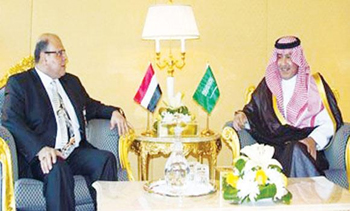Riyadh, Sep 17: Delegates at a conference here have slammed the Islamic State (IS) terrorist group for its violent actions in the Middle East, and lambasted Israel for continuing to oppress the Palestinians.
 Prince Abdulaziz bin Abdullah, deputy foreign minister, opened the two-day conference on “Arabian Gulf and Regional Challenges” in Riyadh on Tuesday.
Prince Abdulaziz bin Abdullah, deputy foreign minister, opened the two-day conference on “Arabian Gulf and Regional Challenges” in Riyadh on Tuesday.
Prince Abdulaziz denounced IS terrorism in Iraq and Israeli extremism in Gaza. Addressing the inaugural session, he asked the international media to refrain from relating IS with Islam or calling it Islamic State.
Referring to the organization by its previous name, the Islamic State of Iraq and Syria (ISIS), he said: “ISIS does not represent Islam. There is no place for violence in Islam, a religion of peace spread the world over by Prophet Muhammad, peace be upon him.”
In his welcome address on behalf of Prince Saud Al-Faisal, minister of foreign affairs, Prince Abdulaziz said that “our region is witnessing unprecedented disturbances.”
He accused the Israeli government of committing crimes against humanity in Gaza. He said that events in Syria, Iraq and Yemen have negatively affected the region.
Prince Abdulaziz said the Kingdom has donated $500 million for victims of violence in Iraq and help displaced people get access to electricity, water and sanitation. In addition, the Kingdom has also given a grant of $114 million for development projects in Yemen.
He said that international efforts must continue to curtail Iran’s nuclear ambitions, which is essential for a peaceful Middle East.
Addressing the brainstorming session on regional changes, Anwar M. Gargash, minister of state for foreign affairs, United Arab Emirates, echoed the sentiments expressed by Prince Abdulaziz.
“We Gulf Cooperation Council representatives are here today to highlight our resolve and commitment to stability and security in the region, and readiness to support moderation and tolerance.”
Speaking at the first session, Abdullatif bin Rashid Al-Zayani, the GCC secretary general, highlighted peace, prosperity and security issues. Referring to displaced people in Palestine, Syria, Lebanon and Jordan, he said a comprehensive plan is required to end their suffering.
Addressing the second session on Gulf security, Jamal Al-Salal, Yemeni minister of foreign affairs, said: “The crisis in Yemen has been complicated by the involvement of Al-Qaeda and Ansarullah, and the country faces severe security challenges.”
Saeb Erekat, chief negotiator for Palestine, lambasted America and other Western countries for supporting Israel’s violence in occupied territory. Erekat also accused the media of anti-Islam bias. He said that when Jewish people kill innocents in Hebron, they do not term it “Jewish terror,” or US soldiers recently killing 29 people as “Christian terror.”
He also criticized US President Barack Obama for refusing to consider Israeli action in Gaza as war crimes.





Comments
Add new comment